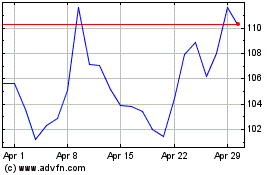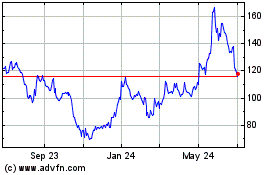Chinese Covid Vaccine Gives Scientists Pause Over Antibody Levels in Early Trials
November 18 2020 - 2:15PM
Dow Jones News
By Chao Deng
A leading Covid-19 vaccine under development in China showed
inconclusive results about its level of protection, although
scientists remain optimistic that the candidate can be among a
roster of effective vaccines used to fight the pandemic.
In early-stage clinical trials, Sinovac Biotech Ltd.'s CoronaVac
vaccine was shown to induce antibodies in the human body within 28
days of the first immunization, according to results published in
the Lancet medical journal this week. The level of antibodies,
however, were lower than that seen in people who were previously
infected with Covid-19.
By contrast, the levels of antibodies in results from vaccine
trials by Pfizer Inc. and Moderna Inc. were roughly on par with
those in people who previously contracted the virus. This week,
Pfizer said its experimental vaccine was 95% effective at
protecting people from Covid-19, while Moderna said its vaccine was
94.5% effective based on an early look at late-stage results.
The results from Sinovac are for Phase 1 and Phase 2 clinical
trials, which aren't designed to measure whether the vaccine works
but can indicate whether it provokes an appropriate immune
response. The firm hasn't published late-stage, or Phase 3,
results, which measure efficacy.
"One would have liked the antibody levels to be comparable,"
said William Schaffner, professor of preventive medicine at
Vanderbilt University School of Medicine. However, he said, the
finding "may just mean the duration of protection may not be quite
as long."
Scientists don't know what absolute level of antibody is needed
to protect against the new coronavirus disease. It is possible that
Sinovac's vaccine induces enough antibodies to confer
protection.
The level of antibody often correlates with the duration of
protection, although Dr. Schaffner said that Sinovac's results
don't rule out its vaccine being able to protect people for a
similar period of time as the Pfizer and Moderna vaccines.
China is behind four of nearly a dozen Covid-19 vaccines that
are in the last phase of clinical trials, according to the World
Health Organization, having recruited tens of thousands of
volunteers around the world.
Scientists say the Chinese candidates may ultimately prove less
effective than Western counterparts that use advanced gene-based
technologies; the effective rates of more than 90% reported by
Pfizer and Moderna surprised the scientific community, where many
were hoping that the experimental Covid-19 vaccines would be at
least 50% effective.
Both Sinovac and state-owned Sinopharm, the two leading Chinese
vaccine developers, are using inactivated viruses for their
vaccines. That technique involves growing viruses in a petri dish
and then weakening them for vaccine purposes.
China has begun using vaccines by Sinovac and Sinopharm on
hundreds of thousands of its citizens under an emergency-use
program that started in July.
The Chinese drugmakers and government officials have declared
the vaccines as safe to use, even as global public-health experts
warn of the dangers of using vaccines so broadly and before
clinical trial results are published.
Sinopharm has said that none of the 56,000 people who have
received its vaccines, including Chinese workers overseas, have
gotten infected. The firm's chairman, Liu Jingzhen, at a recent
conference shared an example from an office of Huawei Technologies
Co. in Mexico, where none of the 81 employees who were inoculated
got infected; 10 employees who didn't get the vaccine ended up
getting infected, he said.
The Huawei example didn't appear to be part of a clinical trial
by Sinopharm, which is conducting formal studies in the United Arab
Emirates, Bahrain, Egypt and other places.
Sinovac hasn't disclosed outcomes from people who have been
inoculated with its vaccine and then traveled abroad.
Zhu Fengcai, who is an official at the Jiangsu province branch
of the China Center for Disease Control and Prevention and a lead
author of the Sinovac study laying out the result of the
early-stage trials, said the quick antibody response the company's
vaccine induced could make it suitable for emergency use. "However,
further studies are needed to check how long the antibody response
remains," he said.
Sinovac researcher Zeng Gang, another of the study's authors,
said CoronaVac could be an attractive option because it can be
stored in a standard refrigerator between 2 and 8 degrees Celsius,
which is typical for flu vaccines. The Moderna and Pfizer vaccines
need to be kept at a range of cold temperatures. Pfizer's must be
stored at minus 70 degrees Celsius and then can be kept at standard
refrigeration temperatures for about five days.
The Sinovac vaccine may also remain stable for up to three years
in storage, which would offer some advantages for distribution to
regions where access to refrigeration is challenging, Mr. Zeng
added.
Sinovac conducted its early-stage trials in Jiangsu province. It
is conducting late-stage clinical trials in Brazil, Indonesia and
Turkey.
Write to Chao Deng at Chao.Deng@wsj.com
(END) Dow Jones Newswires
November 18, 2020 14:00 ET (19:00 GMT)
Copyright (c) 2020 Dow Jones & Company, Inc.
Moderna (NASDAQ:MRNA)
Historical Stock Chart
From Aug 2024 to Sep 2024

Moderna (NASDAQ:MRNA)
Historical Stock Chart
From Sep 2023 to Sep 2024
